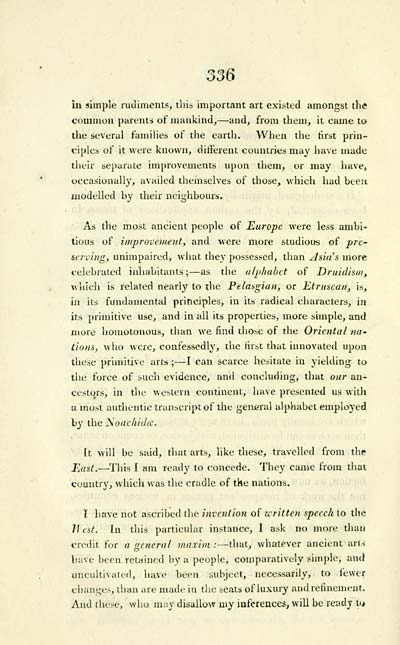Blair Collection > Celtic researches, on the origin, traditions & language, of the ancient Britons
(430)
Download files
Complete book:
Individual page:
Thumbnail gallery: Grid view | List view

536
in simple rudiments, tliib important art exiiited amongst the
common parents of mankind, — and, from them, it came to
the several famiUes of the earth. When the tirst prin-
ciples of it were known, different countries may have made
their separate improvements upon them, or may have,
occasionally, availed themselves of those, which had been
modelled by their neighbours.
As the most ancient people of Europe were less ambi*
tious of improvenieut, and were more studious of pre
serving, unimpaired, \vhat they possessed, than Asia's more
celebrated inhabitants; — as the ulphabet of Druidism,
which is related nearly to the Feloagian, or Etruscan, is,
in its fundamental principles, in its radical characters, in
its primitive use, and in all its properties, more simple, and
more homotonous, than we find those of the Oriental na-
tions, ΛνΙιο were, confessedly, the first that innovated upon
these primitive arts ; — I can scarce hesitate in yielding to
the force of such evidence, and concluding, that our an-
cestors, in the western continent, have presented us \vith
a most authentic transcript of the geiieral alphabet employed
by the Noac/iiiliC.
It will be said, that arts, like these, travelled from the
East. — ^Tliis I am ready to concede. They came from that
country, Avhich was the cradle of the nations.
I have not ascribed the invention of written speech to the
11 est. In this particular instance, 1 ask no more tlian
credit for a genera/ maxim : — that, whatever ancient art.s
have been retained by a people, comparatively simple, and
uncultivated, have been subject, necessarily, to fewer
changes, than are made in the seals of luxury and refinement.
And tliese, who m;iy disallow uiy iufercuces, will be ready to
in simple rudiments, tliib important art exiiited amongst the
common parents of mankind, — and, from them, it came to
the several famiUes of the earth. When the tirst prin-
ciples of it were known, different countries may have made
their separate improvements upon them, or may have,
occasionally, availed themselves of those, which had been
modelled by their neighbours.
As the most ancient people of Europe were less ambi*
tious of improvenieut, and were more studious of pre
serving, unimpaired, \vhat they possessed, than Asia's more
celebrated inhabitants; — as the ulphabet of Druidism,
which is related nearly to the Feloagian, or Etruscan, is,
in its fundamental principles, in its radical characters, in
its primitive use, and in all its properties, more simple, and
more homotonous, than we find those of the Oriental na-
tions, ΛνΙιο were, confessedly, the first that innovated upon
these primitive arts ; — I can scarce hesitate in yielding to
the force of such evidence, and concluding, that our an-
cestors, in the western continent, have presented us \vith
a most authentic transcript of the geiieral alphabet employed
by the Noac/iiiliC.
It will be said, that arts, like these, travelled from the
East. — ^Tliis I am ready to concede. They came from that
country, Avhich was the cradle of the nations.
I have not ascribed the invention of written speech to the
11 est. In this particular instance, 1 ask no more tlian
credit for a genera/ maxim : — that, whatever ancient art.s
have been retained by a people, comparatively simple, and
uncultivated, have been subject, necessarily, to fewer
changes, than are made in the seals of luxury and refinement.
And tliese, who m;iy disallow uiy iufercuces, will be ready to
Set display mode to: Large image | Transcription
Images and transcriptions on this page, including medium image downloads, may be used under the Creative Commons Attribution 4.0 International Licence unless otherwise stated. ![]()
| Early Gaelic Book Collections > Blair Collection > Celtic researches, on the origin, traditions & language, of the ancient Britons > (430) |
|---|
| Permanent URL | https://digital.nls.uk/75768625 |
|---|
| Description | A selection of books from a collection of more than 500 titles, mostly on religious and literary topics. Also includes some material dealing with other Celtic languages and societies. Collection created towards the end of the 19th century by Lady Evelyn Stewart Murray. |
|---|
| Description | Selected items from five 'Special and Named Printed Collections'. Includes books in Gaelic and other Celtic languages, works about the Gaels, their languages, literature, culture and history. |
|---|

